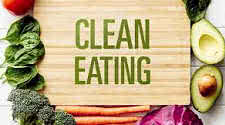Eating Clean - What Foods & Meals does Eating a Clean Diet Consist of?

Find the Right Way to Tackle your Diet Plan for Ultimate Success
In this issue of fitFLEX weekly articles, let's go over a popular question we are faced with from our visitors. Exactly what do bodybuilders
mean when they say they "eat clean"? What's a sample diet for someone who eats this way?
Eating clean generally means consuming food that is as "close to nature" and unprocessed as possible. The more a food is processed, refined
or preserved, the more nutrients are usually lost. Bodybuilders often choose to eat clean to get the most nutrients possible from food, as
well as to avoid undesirable ingredients found in many processed foods, such as corn syrup and partially hydrogenated vegetable oil.
What's the difference between a whole food versus a processed or refined food? Most protein sources, such as meat, chicken and fish, are
considered clean, as you purchase them unprocessed and cook them yourself. Frozen chicken nuggets are obviously not a whole food. Milk and
cheese are considered whole foods; Velveeta is not. Beans are a whole food (and an excellent source of fiber); bean dip is not. Fruit and
dried fruit are whole foods; applesauce and Fruit Roll-Ups are not. Potatoes and tomatoes are whole foods; chips and ketchup are not.
Grains are a great example of a food that can be consumed whole or in a variety of processed forms. Old-fashioned oatmeal is considered a
whole food, while flavored instant oatmeal packets are more processed.
Crackers containing only whole-wheat flour and salt are considered a whole food; Ritz crackers have white flour and partially hydrogenated
vegetable oil. Whereas white bread often contains refined bleached flour, sugar and a long list of other additives, whole- wheat bread should
contain one main ingredient: whole wheat. Whole-wheat bread - especially the darker or "hearty" varieties - is higher in protein and fiber
than white bread.
Read labels, but remember that, although useful in comparisons, nutrient charts don't really tell the whole story. For example, compare the
nutrient composition of an orange versus calcium-fortified orange juice, and the O.J. might seem the better choice. However, an orange in its
natural form has fiber and water, and probably synergistic mechanisms we really don't understand at this point. These synergistic effects of
perhaps yet-unidentified nutrients in whole foods are major reason most health-conscious people choose to eat "low on the food chain."
Bodybuilders consider eating an orange more beneficial than popping a vitamin C tablet or drinking juice. Ironically, many bodybuilders who
claim to eat a whole-foods diet also consume many supplements, such as bars and meal-replacement shakes. Processed engineered bars and powders
are not whole foods, although they may contain fiber, vitamins and minerals.
It's actually difficult and time-consuming to maintain a diet composed of only whole foods, but making a conscious effort to eat a few whole
foods each day can provide many bodybuilding benefits. Buy fresh protein foods, all-natural peanut butter, whole-wheat bread, old-fashioned
oatmeal, nuts, milk, brown rice and lots of vegetables and fruit. Besides gaining the benefits of nutrient- packed food, you'll be avoiding
the unhealthy oils, sodium and sugar added to most processed foods.